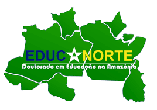Banca de DEFESA: GILVANIA PLÁCIDO BRAULE
Uma banca de DEFESA de DOUTORADO foi cadastrada pelo programa.STUDENT : GILVANIA PLÁCIDO BRAULE
DATE: 05/04/2024
TIME: 14:30
LOCAL: Meio virtual
TITLE:
Pan-Amazon Ecouniversity: ecoculturality And Human-Ecological Context With Inc-Ufam Graduates
KEY WORDS:
University. Ecouniversity. Ecoculturality. Ecocultural Education. Pan-Amazon.
PAGES: 298
BIG AREA: Ciências Humanas
AREA: Educação
SUBÁREA: Currículo
SPECIALTY: Currículos Específicos para Níveis e Tipos de Educação
SUMMARY:
This Letter-Thesis on Education in the Amazon dared in its general objective to build a Pan-Amazonian EcoUniversity theory with cultural, socioeconomic and environmental foundations together with undergraduate graduates (2010-2023) of the Institute of Nature and Culture (INC) of the Federal University of Amazonas (UFAM), located in the Alto Solimões microregion on the border of Brazil, Peru and Colombia. To achieve this, we achieve specific objectives: i) create an epistemology that considers the biocultural being in its social, environmental and cultural practices and a theory of education for indigenous and non-indigenous living well; ii) develop a research method considering feeling/cosmofeeling, knowledge/cosmovision and living well/well-living; iii) verify the recognition of indigenous people and ethnic and sociocultural diversity in official documents related to the topic; iv) know and analyze the personal, ethnic, academic-professional profile of undergraduate graduates, and their perceptions, impressions and perspectives regarding Higher Education and the University; v) develop an EcoUniversity concept with the productions of ecocultural workshops. This qualitative case study deals with a transdisciplinary object, with critical-decolonial bases (FREIRE, 1969; WASH, 2015), contextual meta-epistemology (VARGAS, 2022), philosophy of complexity (MORIN, 2000), philosophy of good living ( ACOSTA, 2016; KRENAK, 2000) and ecoculturality (BRAULE; BRASILEIRO, 2021). The human-ecological fabric method created in this Doctoral Thesis guided the bibliographic, documentary and empirical study from the premises of ecoculturality. The field study took place in two phases: 1st) application of the survey I questionnaire to the population of 1,321 graduates with 453 respondents, generating an initial sample; 2nd) application of a survey II questionnaire, conversation circles, semi-structured interviews and ecocultural workshops with a sample group of 28 participants from the respondents, using inclusion/exclusion criteria, with course equivalence, indigenous and non-indigenous and gender. They perceive their University as a field of multiple beings and knowledge, however, it still needs to listen to and value local knowledge; also conceptualize Ecouniversity as an Ecocultural University of multiworlds in cultural, environmental and epistemic connections. Thus, we defend the Thesis of the Pan-Amazonian Ecouniversity as a field of Higher Education and Sciences with the mission of cultivating knowledge in ecocultural relationships for “living well” and “living well” among the people that constitute it.
COMMITTEE MEMBERS:
Externo à Instituição - CLARIDES HENRICH DE BARBA - UNIR
Externa à Instituição - EGESLAINE DE NEZ - UFRGS
Externo à Instituição - EVANDRO LUIZ GHEDIN - UFAM
Externa à Instituição - JUCIENE RICARTE APOLINÁRIO - UFCG
Externa à Instituição - SUELY APARECIDA DO NASCIMENTO MASCARENHAS - UFAM
Presidente - 1030394 - TANIA SUELY AZEVEDO BRASILEIRO




